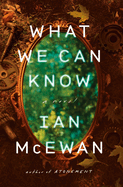
What We Can Know is a psychologically acute story wrapped in a tantalizing literary mystery, and it serves as evidence that Ian McEwan (Atonement; Nutshell) is still producing serious fiction that compares favorably with the best work from his long career.
The novel begins in 2119, in an England that's been transformed into an archipelago following a 2042 event known as the Inundation. Earth's population has fallen below four billion, clashing warlords vie for North American territory, and a dominant Nigerian empire controls the Internet. At a British university, Thomas Metcalfe, a humanities professor, is obsessed with a poem entitled "A Corona for Vivien." The poem was a gift from eminent English poet Francis Blundy to his wife on her 54th birthday. Written in Blundy's hand on vellum, it was never published, and the only known copy has vanished amid conflicting claims of its whereabouts.
Metcalfe's description of his search merges seamlessly with a subtly moving meditation on the struggle to preserve a collective memory of the best of civilization's culture on a climate-ravaged, economically diminished planet. At every turn, What We Can Know satisfies expectations even as it generates fresh anticipation. Its keen insights about some of the darkest and most mystifying aspects of the human psyche are presented in the way one would expect from a novelist of Ian McEwan's experience and talent as he leads readers through the complex emotional labyrinth of this memorable story. --Harvey Freedenberg, freelance reviewer

